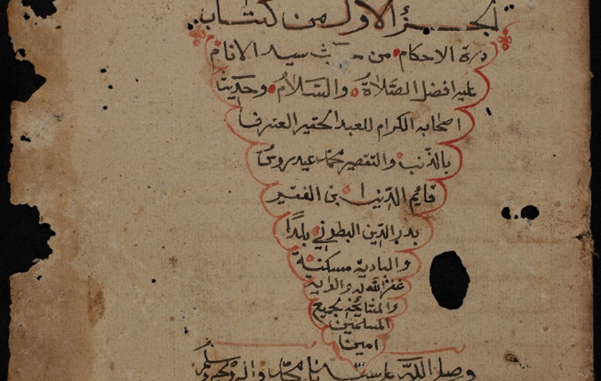
The names Muḥammad ‘Aydrūs Qā’im al-Dīn ibn Badr al-Dīn al-Buṭūnī, Sultan Muḥammad ʿAydarūs, Sultan Muhammad Idrus Kaimuddin, La Ode Muhammad Idrus Qaimuddin, and La Ode Muhammad Idrus Kaimuddin refer to the same person, the King of Buton, a small island off the coast of Southeast Sulawesi, who ruled from 1824-1851. He will be referred to below as Sultan ‘Aydrūs.
The Islamic Kingdom of Buton was a well-known in Nusantara because it adhered to the “Martabat Tujuh (The Seven Dignities)” in the ethical system and state law in force in the kingdom. Adhering to the Martabat Tujuh means the implementation of the wahdatul wujud Sufi teachings based on al-Tuḥfah al-Mursalah ilá Rūḥ al-Nabī by al-Burhanpūrī. This system had been in force in Buton since at least the 17th century when Sultan Dayanu Ikhsanuddin ruled the kingdom. Nevertheless, written proof of this is very hard to find. In general, the manuscripts from the Buton kindom stem from the mid-19th century and they were made during the reign of Sultan ‘Aydrūs (Yunus 1995, 93-110).
Sultan ‘Aydrūs is not only known because he was a King and a Sufi (Niampe 2010, 250-265). He was also an intellectual (Rosdin 2014, 109) who was a prolific author during the time of his reign. Nevertheless, as also stated by Peacock (2019, 62), Sultan ‘Aydrūs never referred to himself in his work as King, but rather as al-faqīr al-ḥaqīr (weak servant). Virtually all his works start with a statement that he wrote at the request of his friends, among them the Arab, Shaykh Aḥmad ibn Muḥammad al-Muqrī, from Yemen.

(Source: DS 0010 00076)
The manuscript legacy of the Buton Kingdom is not only kept in the palae but the manuscripts were dispersed to the places where his family members came to live. In 2001, Achadiati Ikram made a catalogue of the manuscripts owned by Abdul Mulku Zahari while seven years later, Suryadi, through the Endangered Archives Programme (EAP 212) digitalized the collection together with five other collections owned by La Ode Ansari Idris, Hazirun Kudus, La Gina, La Mbalangi, and La Tamanajo.
Some of the manuscripts that have been digitized of these six collections concern works written by Sultan ‘Aydrūs. Peacock (2019, 64-80) states that Sultan ‘Aydrūs was in possession of many Islamic works, 9 of which were written in Arabic and 4 in the local Wolio language. They can all be consulted digitally under EAP 212.
Peacock omitted some titles of Sultan ‘Aydrūs’s other works that are preserved in the collection of La Ode Zaenu which were digitized by DREAMSEA (DS 0010) in 2018. This collection contains no less than 10 works by Sultan ‘Aydrūs which are kept in six manuscript bundles. Illustrations of all of them follow below.

The manuscript contains Hadith of the Prophet Muḥammad chosen from the best sources.
(Source: DS 0010 00018; Starting with image: DS_0010_00018_001r)

The manuscript contains a collection of Hadith of the Prophet Muḥammad about the principles of religion and the morals of pious people.
(Source: DS 0010 00041; Starting with image: DS_0010_00041_009r)

The manuscript contains a collection of 40 Hadiths of the Prophet Muhammad on a number of theological principles.
(Source: DS 0010 00041; Starting with image: DS_0010_00041_018v)

The manuscript contains a collection of Hadiths of the Prophet Muhammad on the principles behind the search for knowledge, especially pertaining to the relationship between teachers and students.
(Source: DS 0010 00041; Starting with image: DS_0010_00041_024v)

The manuscript contains explanations on the Hadiths in the Bulūgh al-marām by Ibn Ḥajar al-‘Asqalanī.
(Source: DS 0010 00055; Starting with image: DS_0010_00055_001v)

The manuscript contains Hadith of the Prophet Muḥammad chosen from the best sources.
(Source: DS 0010 00055; Starting with image: DS_0010_00055_015v)

The manuscript contains a collection of 40 Hadiths of the Prophet Muhammad Manuskrip ini berisi empat puluh hadis Nabi Muhammad on a variation of theological principles.
(Source: DS 0010 00063; Starting with image: DS_0010_00063_016r)

The manuscript contains a collection of litanies (wirid) and prayers and tells how to say them.
(Source: DS 0010 00076; Starting with: DS_0010_00076_001r)

The manuscript is about the vital importance of dzikir and the proper way to praise the Prophet Muhammad (ṣalawah) and its superior importance.
(Source: DS 0010 00088; Starting with: DS_0010_00088_002v)

The manuscript deals with the Oneness of God, remembrance, theological schools in history and a story about kings.
(Source: DS 0010 00088; Starting with image: DS_0010_00088_003v)

